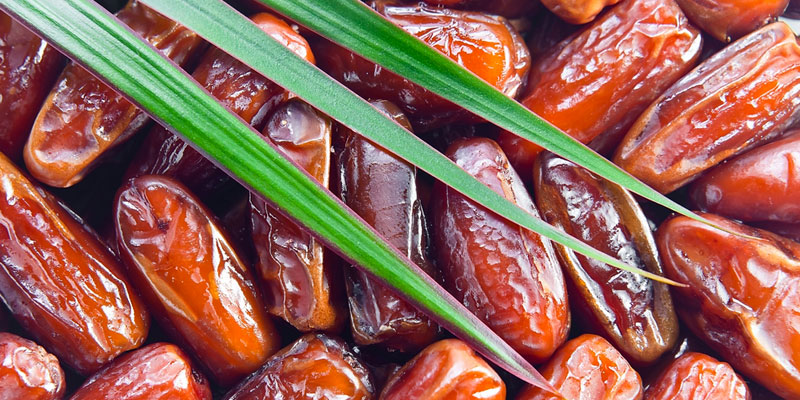Date beer doesn’t immediately taste like dates. At least, “Brother Dewey’s Date Night” doesn’t. Made by the College Street Brewhouse in Lake Havasu, Arizona, the beer opens with aromas of nutmeg, cinnamon, and coriander. The brown ale is a touch bitter, and tastes like caramel and figs and spiced raisins. It’s only at the end that you realize you’re drinking dates.
“Brother Dewey’s Date Night” is a seasonal limited edition. The brewers use 200 pounds of fruit to brew 30 barrels after the harvest, and then age the resulting brew for 12 months or more before it hits the restaurant floor.
Archaeological evidence suggests dates have been used to make wines and enhance beers since ancient Egypt. But alcohol has never been their primary application. Most dates are sold as straight-up food, to be eaten solo or incorporated into a variety of sweet and savory dishes (think bacon-wrapped dates, chocolate-covered dates, and dates stuffed with nuts or cheese).
But date beer is having a tiny renaissance in America. College Street Brewhouse is one of a handful of brewers that use the fruit in concocting their libations. Other producers of date beer include Shorts Brewing’s Ben’s Asthma, Deep Ellum Brewing’s Play Date, and Figure Eight Brewing’s Date Night Black Barleywine Ale.
One of the things that makes “Brother Dewey’s Date Night” so unique is how hyper-local its ingredients are. College Street Brewhouse sources its dates from the very region where it serves its beer – Yuma, Arizona, just south of the dwindling Colorado River.
This arid corner of the United States is an agricultural powerhouse. Stretching across a swath of desert from Yuma County to Bard Valley, California, the area is fed by the river and perennial sunshine, with views directly into Mexico. Yuma produces 90 percent of the nation’s leafy greens through the winter months. And date production, which fills the off-season, is on the rise.
The Yuma area produces about 10 million pounds of dates each year. It is one of the nation’s biggest date producers, in large part thanks to Isabel and Bartola Nuñez and their date farm, Imperial Date Gardens.
The Nuñez family’s story dates back to 1958, when a man by the name of Isabel Nuñez came to the United States from Mexico as a guest worker hired by dairy farmer Clyde Bowman. Nuñez and Bowman just sort of clicked, Nuñez’s son Gus explains.
“My dad was a hard worker and his boss recognized his dedication, so they sponsored him to become a resident alien,” he tells me. “Eventually, through him and my mom working and saving, they saved up enough to buy a little land.”
But well before he owned his own land, Isabel discovered his true calling. A couple of date trees grew on Bowman’s property. Urged on by his brother, Nuñez asked to care for them so that he could harvest and sell the dates. “So, he worked the trees, bought 10 acres down the road,” Gus says. “Ten acres turned into 100. One hundred became 1,000, and now there’s over 3,400 acres that Mr. Nuñez owns or controls.” It was the ultimate American Dream.
In the early days of Imperial Date Gardens, Nuñez kept his job with Bowman and devoted weekends to the date palms. His three kids, who have now taken the company reins, helped him. They would climb up the trees to clean them, then to harvest the dates.
Medjools are a labor-intensive crop: People climb the trees roughly 17 times a season to clean, hand-pollinate, and harvest the dates when they are ripe.
Imperial Date Gardens now employs almost 300 people year-round, and an additional 500 at peak seasons. Its partner entity, DatePac, a packing plant held alongside other local growers, employs roughly 1,500 individuals seasonally.
With an agricultural industry worth $3.3 billion annually, Yuma, like many agricultural areas in the U.S., relies heavily on the work of migrants; Eric Trump, Donald Trump’s son, recently applied for six more H2A visas to bring in workers to his vineyard in Virginia. But places like Bard Valley and Yuma County highlight the challenges faced by these workers, even those with visas allowing them to work in the U.S. legally.
Like Isabel Nuñez — and like most of the area’s agricultural workers — many Imperial Date Gardens employees hold H2A visas. But the hoops and expenses of being a guest worker in the current system mean that many overburden themselves just to make ends meet.
“There’s a labor pool in the Yuma area,” says Gus. “There are people who live in San Luis [Mexico] who commute across the border every morning. They wake up at 3[a.m.] and sit in line for two hours.” Others cross the border at midnight to skip the lines only to sleep in their cars until work starts. “It’s disheartening, because a lot of them eventually burn out, because it’s such a grind based on commuting and waiting in line for that timeframe,” Gus says.
In the meantime, though, Yuma has enough workers to keep the dates thriving and the date beer flowing.


